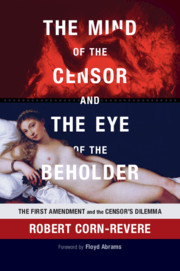Book contents
- Advance praise for The Mind of the Censor and the Eye of the Beholder
- The Mind of the Censor and the Eye of the Beholder
- The Mind of the Censor and the Eye of the Beholder
- Copyright page
- Contents
- Figures
- Dedication
- Foreword
- Acknowledgments
- Permissions
- 1 The Censor’s Dilemma
- 2 Anthony Comstock: Professional Anti-vice Crusader
- 3 Comstock’s Legacy: A Dilemma Is Born
- 4 The Comstock Playbook
- 5 Seduction of the Innocent: The Comic Book Menace
- 6 Ya Got Trouble: Censorship and Popular Music
- 7 The Vast Wasteland
- 8 New Age Comstockery: The Indecency Wars
- 9 The Anti-free Speech Movement
- 10 Freedom of Speech and the Spirit of Liberty
- Epilogue
- References
- Index
9 - The Anti-free Speech Movement
Published online by Cambridge University Press: 07 October 2021
- Advance praise for The Mind of the Censor and the Eye of the Beholder
- The Mind of the Censor and the Eye of the Beholder
- The Mind of the Censor and the Eye of the Beholder
- Copyright page
- Contents
- Figures
- Dedication
- Foreword
- Acknowledgments
- Permissions
- 1 The Censor’s Dilemma
- 2 Anthony Comstock: Professional Anti-vice Crusader
- 3 Comstock’s Legacy: A Dilemma Is Born
- 4 The Comstock Playbook
- 5 Seduction of the Innocent: The Comic Book Menace
- 6 Ya Got Trouble: Censorship and Popular Music
- 7 The Vast Wasteland
- 8 New Age Comstockery: The Indecency Wars
- 9 The Anti-free Speech Movement
- 10 Freedom of Speech and the Spirit of Liberty
- Epilogue
- References
- Index
Summary
Chapter 9 focuses on various theorists who make up the Anti-Free Speech Movement, starting with philosopher Herbert Marcuse. They suggest that the First Amendment has been interpreted too broadly to allow protection for speech they believe is intolerable, and that this should be reversed. The chapter examines those who have espoused critical race theory to develop arguments for suppressing hate speech, and feminists who advocate suppressing sexually oriented speech. The connection between these various theorists is that they argue that the First Amendment has gone too far, yet they vigorously deny that they support censorship. In doing so, they adopt the rhetoric and tactics designed by Anthony Comstock, Fredric Wertham, and Newton Minow before them.The chapter concludes that the purpose of the First Amendment is to block government from having the type of power these theorists advocate, and suggests that one way to preserve free speech is to use this list of characteristics as a means of identifying censors.
Keywords
- Type
- Chapter
- Information
- The Mind of the Censor and the Eye of the BeholderThe First Amendment and the Censor's Dilemma, pp. 240 - 272Publisher: Cambridge University PressPrint publication year: 2021

